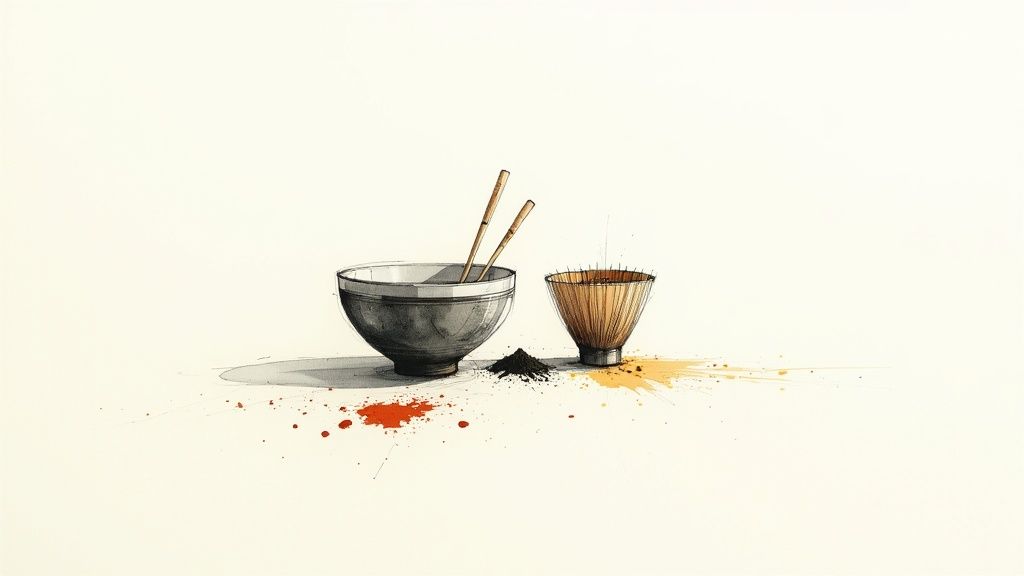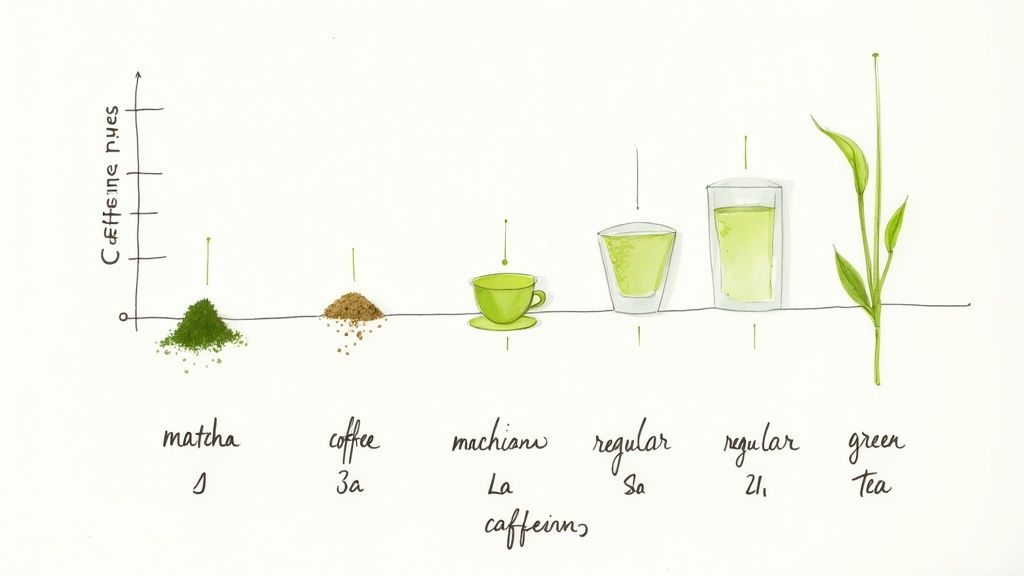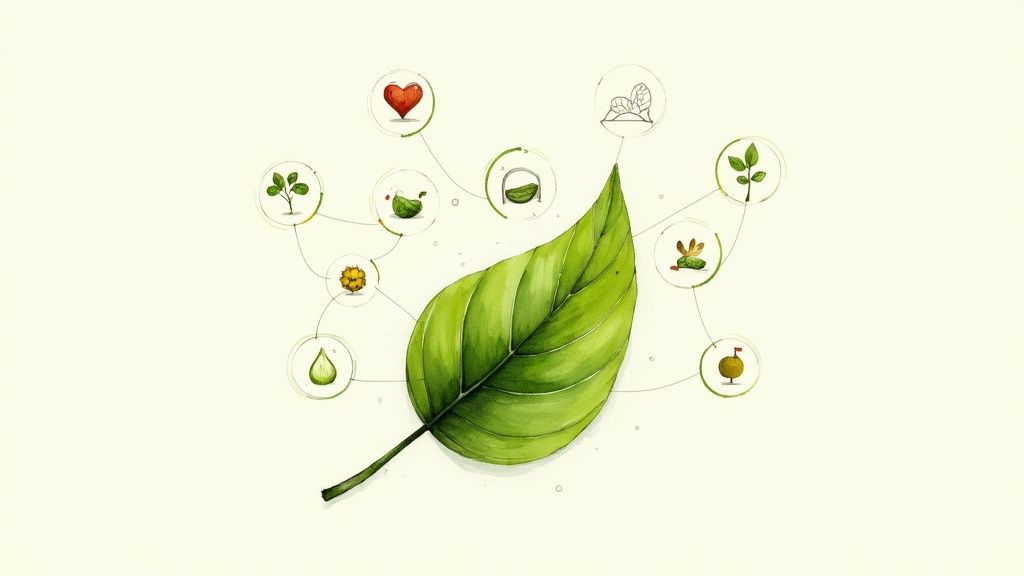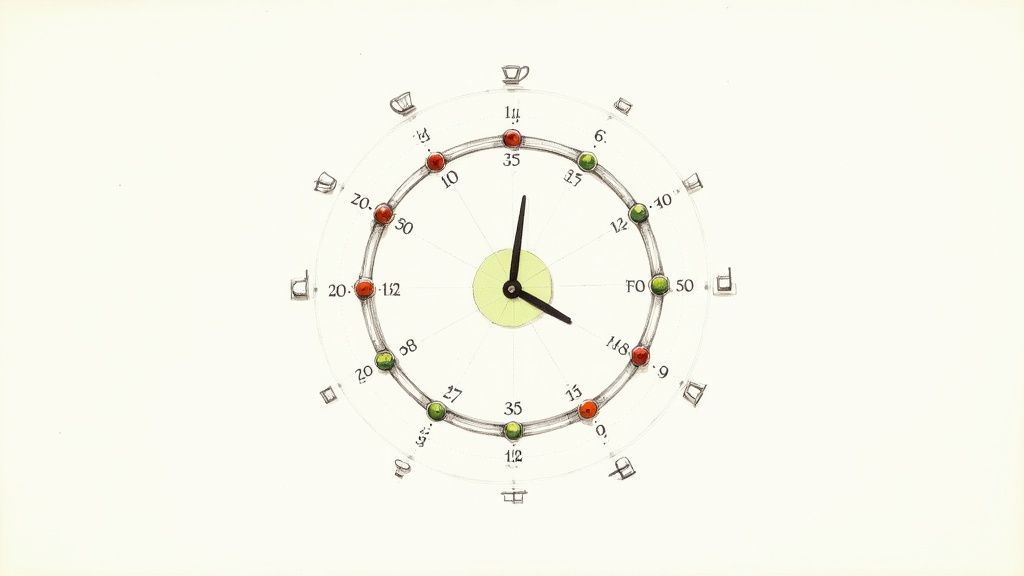What is Matcha?

Matcha, a vibrant green powder, has captured the attention of tea aficionados globally. But what exactly makes this unique tea so special? In essence, matcha is a type of green tea, yet its production differs significantly from traditional green tea. This difference lies at the heart of understanding its unique properties, particularly its caffeine content. Both matcha and regular green tea originate from the Camellia sinensis plant, but their journeys from leaf to cup take distinct paths. This divergence is what sets matcha apart in the world of tea.
Matcha vs. Regular Green Tea: Two Sides of the Same Leaf
Regular green tea follows a familiar brewing process: the leaves are steeped in hot water, similar to preparing a herbal infusion. The leaves are then removed, leaving behind a flavorful, though less potent, beverage. Matcha, on the other hand, undergoes a completely different treatment. Matcha leaves are carefully shade-grown for weeks before harvest, increasing their chlorophyll content. This process not only gives matcha its striking green hue but also enhances its nutritional profile. Post-harvest, the leaves are dried and ground into a fine powder. This means that drinking matcha involves consuming the entire leaf, not just an infusion. This distinction has a significant impact on caffeine intake. Imagine eating a whole apple versus drinking apple juice – the whole fruit offers more fiber and nutrients. Similarly, consuming the entire matcha leaf provides a more concentrated dose of its components, caffeine included.
Does Matcha Contain Caffeine?
Yes, matcha absolutely contains caffeine. Because you ingest the entire leaf, matcha tends to have more caffeine than a similar serving of regular green tea. This concentrated dose contributes to its energizing effects. However, matcha's caffeine doesn't deliver the same jolt as coffee. Rather, it offers a sustained and balanced energy boost. This is partly due to the presence of L-theanine, an amino acid that interacts with caffeine to promote a calm alertness. As a result, matcha can provide focus and energy without the jitters or crash often linked to coffee. The synergy between caffeine and L-theanine makes matcha a singular beverage, providing both energy and tranquility. This unique blend explains matcha's rising popularity among those seeking a natural energy lift.
Caffeine Content in Matcha

As we've established, drinking matcha involves consuming the entire leaf. Naturally, this raises the question of how this impacts the caffeine content. Does matcha have caffeine? The answer is a definitive yes. In fact, matcha possesses a higher caffeine concentration than traditionally brewed green tea. This arises from the fundamental difference in consumption: ingesting the whole leaf versus steeping and discarding it. This difference in processing directly influences the amount of caffeine consumed.
Comparing Caffeine Levels: Matcha and Other Beverages
To illustrate this difference, let's consider a standard serving of matcha, typically using about 2 grams of powder. This serving can contain between 32 and 68 milligrams of caffeine. By comparison, a standard cup of brewed green tea usually contains between 25 and 35 milligrams. This seemingly small difference can significantly affect energy levels. For instance, even this slight increase could be noticeable for those sensitive to caffeine. Some matcha varieties contain up to 70 milligrams of caffeine per serving, similar to a cup of coffee.
Furthermore, matcha’s caffeine content can even exceed that of a typical cup of coffee, which generally falls within the 80 to 100 milligram range per 8-ounce serving. However, the key isn't just the amount of caffeine but how your body processes it. This brings us to a vital aspect of matcha’s caffeine: its interaction with L-theanine. This interaction is central to understanding matcha's sustained energy boost.
The Caffeine-L-Theanine Synergy: A Balanced Approach to Energy
While knowing whether matcha has caffeine is important, understanding how that caffeine affects you is equally crucial. L-theanine significantly alters the caffeine experience. This amino acid, also found in matcha, works in synergy with caffeine. Imagine them as two complementary forces: caffeine provides the invigorating lift, while L-theanine tempers jitters and promotes calm focus. This results in a smoother, more sustained release of energy, unlike the sharp spike and crash often associated with coffee. This sustained release makes matcha an excellent choice for those desiring focused energy without the anxiety or restlessness of a coffee-induced rush. This powerful combination offers the alertness and cognitive benefits of caffeine without the downsides. This is a defining characteristic that sets matcha apart from other caffeinated drinks. Therefore, even when matcha's caffeine content is similar to coffee, the overall experience is remarkably different.
Caffeine Considerations: Matcha and Your Well-being
Given its caffeine content, mindful matcha consumption is essential, especially for those with sensitivities. While the sustained release reduces the risk of jitters and crashes, monitoring intake remains important, particularly during pregnancy, breastfeeding, or when managing underlying health conditions. Health organizations generally recommend limiting caffeine to under 200 milligrams per day for pregnant and breastfeeding women. For healthy adults, the FDA suggests a maximum of 400 milligrams daily. Keeping these guidelines in mind, along with knowing the caffeine levels in your chosen matcha brand, allows you to enjoy this beverage responsibly. This mindful approach ensures that you reap matcha's invigorating and calming benefits within healthy caffeine limits.
How Matcha is Processed
Having explored what matcha is and its caffeine content compared to other beverages, let’s examine the meticulous process that transforms green tea leaves into the fine, vibrant powder we recognize as matcha. This journey, from leaf to powder, significantly influences matcha's caffeine content.
From Shade to Harvest: The Journey Begins
The matcha production process starts weeks before harvest. Unlike regular green tea, matcha leaves are shade-grown for about 20-30 days prior to picking. This shading triggers essential changes. For instance, it increases chlorophyll production, resulting in matcha's vibrant green color. Furthermore, shading boosts amino acid production, including L-theanine, which contributes to the unique flavor and calming effects. This careful nurturing sets the stage for the transformation into matcha powder.
Post-Harvest Processing: A Multi-Step Transformation
After harvesting, the leaves are steamed to prevent oxidation and preserve their vibrant color and nutrients. While this mirrors the process for other green teas, the following steps are what differentiate matcha. Post-steaming, the leaves are carefully dried, traditionally in large, airy rooms. This further concentrates the flavors and nutrients. Next, the stems and veins are meticulously removed, ensuring a smooth and fine powder. This de-stemming process sets matcha apart from other green teas, which retain stems and veins, contributing further to matcha’s unique characteristics.
The Final Grind: Achieving the Signature Powder
The final stage involves grinding the dried, de-stemmed leaves. This is done using granite stone mills, which rotate slowly to prevent heat buildup that could alter the flavor. This careful grinding, reminiscent of using a mortar and pestle for spices, preserves the integrity of the leaves. The result is the vibrant green matcha powder. This entire process, from shading to stone-grinding, gives matcha its special properties, including its elevated caffeine level compared to regular green tea. The resulting powder encapsulates the essence of the entire leaf, delivering concentrated nutrients and caffeine with each sip. This intricate process truly elevates matcha to an exceptional beverage.
Health Benefits

We’ve explored the caffeine content of matcha and how it compares to other beverages. Now, let’s turn our attention to its potential health benefits. Beyond caffeine, matcha offers a wealth of potential advantages for well-being.
Antioxidant Powerhouse: Protecting Against Cellular Damage
Matcha is known for its high concentration of antioxidants, specifically catechins. Antioxidants protect your cells from damage caused by free radicals, unstable molecules that contribute to aging and health problems. For example, epigallocatechin gallate (EGCG), a potent catechin in matcha, is believed to be considerably more potent than vitamin C. This abundance of antioxidants may offer protection against chronic diseases like heart disease and certain cancers.
Boosting Brain Function: Enhancing Clarity and Focus
In addition to antioxidants, matcha may also support cognitive function. The caffeine and L-theanine synergy plays a crucial role here. Caffeine boosts energy and alertness, while L-theanine encourages relaxation and reduces stress. This combination creates a state of calm focus, leading to improved concentration, memory, and reaction time. Consequently, matcha can sharpen your mind without the jitters often linked to other caffeinated drinks. Research even suggests that matcha may offer protection against age-related cognitive decline.
Supporting Metabolism and Energy Levels: A Natural Boost
Matcha may also offer benefits for weight management and sustained energy. Studies indicate that matcha can increase metabolism and fat burning. However, these effects are generally modest and work best when combined with a healthy diet and exercise. Moreover, matcha's balanced energy boost helps you stay energized throughout the day without the crashes often experienced with coffee. This makes it a healthy alternative for sustained, natural energy.
Additional Potential Health Perks of Matcha
The potential benefits of matcha extend further. Promising research is exploring its role in:
- Liver health: Matcha may help protect and improve liver function.
- Heart health: Its antioxidants may contribute to lower blood pressure and cholesterol.
- Immune system support: Matcha contains various vitamins and minerals that can strengthen immunity.
This overview, while not exhaustive, highlights key potential benefits. Learn more in our article about The Health Benefits of Matcha Tea. While matcha offers promising health benefits, it's not a miracle cure. A balanced diet, exercise, and healthy lifestyle remain essential. However, incorporating matcha can be a delicious and potentially beneficial addition to your health journey.
Best Times to Drink Matcha

Having covered the health benefits and unique processing of matcha, a key question remains: when is the best time to enjoy it? Knowing this can help maximize its benefits and incorporate it effectively into your routine. Matcha's caffeine can certainly fuel your day, but strategic timing is key.
Morning Matcha: Starting Your Day with Focus
Many prefer matcha in the morning. The combined effects of caffeine and L-theanine deliver a sustained, focused energy boost, perfect for starting the day with clarity and concentration. Unlike the jitters and subsequent crash that can follow coffee, matcha offers a smoother, more balanced energy release. This allows for enhanced alertness and cognitive function without the anxiety or restlessness sometimes experienced with coffee. Thus, matcha makes a great alternative for a calm yet energized morning.
Afternoon Slump? Matcha Provides a Pick-Me-Up
Matcha is also excellent for combating the afternoon slump. Just as it can kickstart your morning, it can help you power through the afternoon. The gentle, sustained energy boost combats fatigue and improves focus when it's needed most. This makes matcha a healthier and more effective alternative to sugary snacks or more coffee, which can disrupt sleep. Additionally, its calming effects can reduce stress and improve mood, making it a perfect pick-me-up during a busy day.
Evening Matcha: Proceed with Caution
While beneficial in the morning and afternoon, avoid matcha close to bedtime. Its caffeine content, even with L-theanine's modulating effects, can interfere with sleep for some. If you're sensitive to caffeine, even a small amount in the evening might disrupt sleep, especially if you struggle with falling asleep or staying asleep. For example, introducing matcha late in the day could lead to restlessness if you are used to a caffeine-free evening.
Personalized Matcha Timing: Finding What Works for You
Ultimately, the best time for matcha depends on individual needs and preferences. Experiment with different times and observe your body's response. Some find that a little matcha in the evening helps them relax, while others experience sleep disruptions. Pay attention to your energy levels, focus, and sleep quality to determine your optimal matcha timing. By listening to your body, you can harness matcha's power to enhance your routine and well-being.
Conclusion
Does matcha have caffeine? Absolutely. We've discovered that matcha not only contains caffeine but can even surpass the amount in some coffee. However, matcha’s caffeine offers a different kind of energy: a sustained and focused boost without the jitters or crash often associated with coffee. This is due to the synergistic relationship between caffeine and L-theanine. This dynamic duo enhances alertness and cognitive function without the anxiety or restlessness that can accompany other caffeinated beverages.
Matcha: More Than Just an Energy Boost
Beyond caffeine, matcha offers numerous potential health benefits. From potent antioxidant properties to potential positive impacts on brain function, metabolism, and even liver and heart health, matcha is much more than just an energy source. Incorporating matcha into your routine can be a delicious and potentially beneficial addition to a healthy lifestyle.
Enjoying Matcha Responsibly
While matcha offers numerous advantages, mindful consumption is key. Understanding the caffeine levels in your specific brand and considering your personal caffeine sensitivity are crucial for responsible enjoyment, especially for pregnant or breastfeeding women or those with underlying health conditions. By being mindful, you can fully appreciate matcha's unique benefits without exceeding healthy caffeine limits.
Ready to experience the invigorating calm of matcha? Explore our selection of premium matcha at matcha-tea.com and discover your perfect blend. From ceremonial grade for traditional tea ceremonies to culinary grade for recipes, we have something for everyone. Begin your matcha journey today and discover a world of flavor and well-being!
